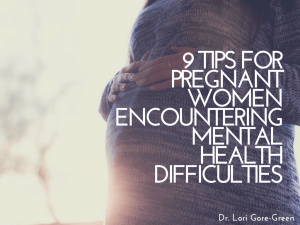 Behavioral symptoms, such as anxiety and depression, uniquely impact pregnant women, who experience the complication and the effects of postpartum depression before they even give birth. For this reason, conversations about mental health and pregnancy should be held early and often.
Behavioral symptoms, such as anxiety and depression, uniquely impact pregnant women, who experience the complication and the effects of postpartum depression before they even give birth. For this reason, conversations about mental health and pregnancy should be held early and often.
Some women go through their entire pregnancy without experiencing morning sickness, swollen feet, and troubled sleeping. However, many don’t escape pregnancy without experiencing pre-baby anxiety. The stress and the “what ifs” can be overwhelming. Lancet Psychiatry published a report in 2015, which stated that two-thirds of mothers with severe depression experienced mood shifts during their pregnancy ahead of postpartum depression. Maternal depression isn’t the same for all women. Approximately 20 percent of mothers experience depression or anxiety after giving birth. Those findings also linked postpartum depression biological triggers and dramatic dips in hormone levels.
There are nine things every pregnant should know about maternal depression and the importance of focusing on mental health during pregnancy:
Document Your Emotional Responses
Pregnant women should take their feelings seriously, and track them. If you notice that you’re feeling sad more often than not, or you feel extremely worried, relay that information to your therapist, doctor, or midwife.
Depression is Blameless
Perinatal mood disorder can be a challenge, and often pregnant women want to blame themselves or their partners for these emotional obstacles, but it’s no one’s fault. There are a number of factors that contribute to pregnancy-related mood shifts.
You’re Not The Only One
Too many women believe they’re the only ones struggling with mental health symptoms, which are some the most common complications of childbirth. The stigma surrounding maternal depression often means that women are too embarrassed to seek out health. Convinced that they should be overjoyed with the prospect of motherhood, sometimes fail to tell others when that they’re struggling.
Seek Treatment Sooner
Therapy can help to ease stress and manage mood disorders. Choosing to deal with one’s mood disorders sooner will ultimately improve your piece of mind, and it will enhance the bonding between you and your child.
Treatment Will Benefit the Baby
Depression and anxiety never simply affect one person, and this is particularly true depressive episodes are affecting a pregnant person. It’s challenging to be a mother, so seeking treatment means that your child won’t have to deal with the emotion and sadness that might could put both you or your child at risk.
Treatments Work
Frank conversations with your primary care physician and your therapist can alleviate anxiety and perinatal depression. It can also help to create a sense of balance and offer an understanding of what balance may look like for a woman in her new life.
You’ll See Progress
If you’re as serious about your mental health as you are about your impending motherhood, you’ll find that you feel better after just a few session. Of course, everyone is different. Even if it takes a bit longer for your mood to improve, know that progress is on the horizon. Take medication appropriately and stay committed to your sessions.
Support Groups, Also
While some women choose isolation, others find strength in knowing that others are going through the same thing. Support groups are incredible because offer a supportive network of like-minded individuals who also need to know that everything in their lives will be okay.
Find Support Online
The internet is great for things outside of news, online shopping, and cyber stalking exes, it’s also a great resource for individuals seeking out others for support.
Online, you’ll find countless resources for mental health and pregnancy wellness. Some things you’ll want to do are to hydrate, do abdominal exercises, eat a well-balanced diet, educate yourself on mental health, take your vitamins and supplements, and rest appropriately.